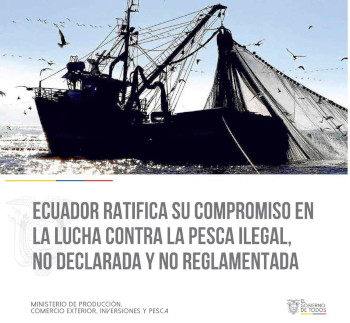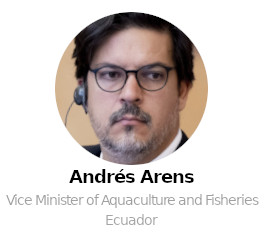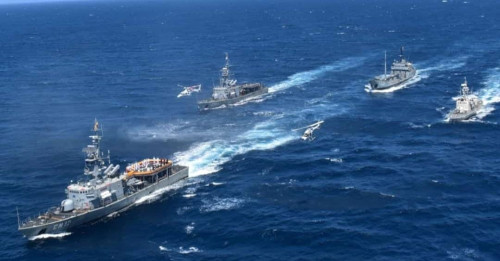|

Image: Ministerio de Producción, Comercio Exterior, Inversiones y Pesca de Ecuador / FIS
Ecuador Relentless in the Fight Against IUU Fishing
 ECUADOR
ECUADOR
Friday, June 09, 2023, 07:00 (GMT + 9)
Ecuador’s fishing industry is of great importance to the country’s economy. Ecuador has the largest tuna purse seiner fleet in the Eastern Pacific; it is the second largest canned tuna processor in the world, the world’s leading shrimp producer, and the leading exporter of swordfish to the United States.
To solidify its fishing industry, the government is working on combating illegal, unreported, and unregulated (IUU) fishing, as well as bringing transparency in marine fisheries, advanced traceability protocols, and good governance for sustainable fisheries management.
Ecuador’s Vice Minister of Aquaculture and Fisheries Andrés Arens spoke with Diálogo about the country’s progress in combating IUU fishing and his country’s fishing activity.
Diálogo: Ecuador went from being sanctioned by the European Union for being a non-cooperating country that did not have the necessary control elements against IUU fishing, to presiding, until 2025, over the most important and relevant binding international agreement in this fight, the United Nations Food and Agriculture Organization’s (FAO) Agreement on Port State Measures (AMERP). What is the significance of this agreement for Ecuador?
Vice Minister of Aquaculture and Fisheries of Ecuador Andrés Arens: Ecuador has undergone a fairly profound evolutionary process in the fisheries sector. This means a rebirth of the fishing sector, especially on the authority side. Although the Ecuadorian fishing industry, both the fleet and the processing plants, met very high levels of traceability and sustainability standards, the State was unable to guarantee that the products processed and marketed from Ecuador came from legal sources. This inability resulted in the 2019 sanction and the transformation we’ve had since that same year that began with the ratification of the AMERP agreement, and today Ecuador is a leader in the region and in the world. We were the first country to upload an inspection report in the FAO information exchange system and we worked to connect our software to theirs.

We’ve had a lot of participation in multilateral forums regarding the fight against IUU fishing; all this change includes the enactment of the Organic Law for the Development of Aquaculture and Fisheries 2020, which embraces AMERP principles. This law sanctions IUU fishing activities such as prohibitions of interaction with unwanted species and vulnerable, protected, and globally threatened species, among other aspects. This law has an investment of more than $65 million and also contemplates improving human and infrastructure capacities. Today we hold the presidency of the AMERP until 2025, which is an honor for the country and for the fishing industry.
Diálogo: What is the importance of your appointment as president of the International Board of the Fisheries Transparency Initiative (FiTI) for the 2023-2025 period? How does Ecuador promote fisheries transparency?
AA: One of the fundamental pillars in fisheries management is to be able to be audited by anyone in the fisheries sector, and the only way to be efficient is to have very high transparency standards, which are coupled with the FiTI traceability standard to which we have adhered. We are one of the countries that has the Online Transparency of Fisheries Management Information assessment known as Taking stock, in which we came out quite well and for which we received recommendations that we are working on.
Diálogo: Each year, hundreds of fishing boats from China, the world’s biggest culprit in illegal fishing, fish off the Latin American coasts, moving with the seasons from Ecuador — approaching the Galápagos marine reserve — to Peru and Argentina. What actions are you taking to prevent the Chinese fleet from trespassing Ecuador’s Exclusive Economic Zone (EEZ)?
.jpg)
Source: Stockfile FIS
AA: This issue is directly the responsibility of the Ecuadorian Navy because it is a sovereignty issue, however, we work closely with them in all our control, monitoring, and surveillance operations. Since 2019 there is a greater public awareness of this problem since this situation has been happening for some years in which this distant fishing fleet as it is technically known, is chasing the giant squid and in certain season it gets very close especially to our insular EEZ, but also continental. This pressure from this fleet, which is quite numerous, is always under the scrutiny of Ecuador’s supervisory bodies. It is important to have the security and certainty that both the fishing authority and the maritime authority are in constant alert to prevent anyone from doing or committing acts contrary to international standards or Ecuadorian domestic law. If any of these vessels were to enter our jurisdictional spaces to carry out fishing activities not authorized by the country, they will surely be sanctioned with the firmness of the law as already happened in 2017 when a Chinese vessel intercepted while fishing illegally in the Galápagos marine reserve, was fined $5.9 million and the crew members were sentenced to prison.
Diálogo: Fish is one of Ecuador’s main export products. Canned fish is the country’s third largest non-oil shipment to the world, after shrimp, and bananas. How is Ecuador’s national fisheries affected by IUU fishing that the Chinese fishing fleet carry out?

The Ecuadorian Navy mobilized an air-naval flotilla to carry out surveillance and control operations near the Galapagos Marine Reserve, in the presence of an international fishing fleet near its ZEE, at the beginning of July 2021. (Photo: Joint Command of the Armed Forces of Ecuador)
AA: IUU fishing is a global evil, not only Ecuador is affected but all coastal communities that carry out fishing activities, either close to their countries or in deep-sea fishing, such as the one that Ecuador mainly carries out. According to FAO reports, IUU fishing generates around $23 billion a year, making it the third largest illicit business in the world. This means that there are many concerns that cause damage not only to biodiversity, because obviously IUU fishing does not meet sustainability standards, but also to the markets by introducing products that compete on unequal terms with fleets such as those of Ecuador, which meets all the standards since the crew have salaries in line with the Ecuadorian reality, with very demanding working, safety, and sanitary conditions. Not to mention the number of sustainability certifications that the country has today, such as the Marine Stewardship Council, which is the best known in the world for sustainability issues, where social, cultural, economic, fishing authority and extractive activity aspects of the vessel are included. So for Ecuador, as for any country with a fishing vocation, IUU fishing activities undoubtedly result in the depletion of resources, because these vessels do not comply with conservation measures, fish where it is not allowed or over the permitted capacities or in certain non-legal seasons. All of this lowers prices because it is unfair competition and at the same time generates competition under unequal conditions, and for countries like Ecuador it has cost us a lot of money to comply with these standards.
Diálogo: What kind of laws exist in Ecuador to combat IUU fishing?
AA: In addition to the organic law, we have issued countless ministerial agreements that already regulate each of the fisheries and that establish norms for the sustainability of the resources and the maximum sustainable yield of the fishing business. We have countless international cooperation agreements to collaborate together and fight IUU fishing such as memorandums of understanding with Colombia, Panama, Costa Rica and we are in negotiations with Peru and Uruguay. We have agreements between Ecuadorian state agencies to articulate processes that depend on various institutions in the most orderly way possible and thus implement international standards.
Author: Geraldine Cook | Diálogo Américas

[email protected]
www.seafood.media
|



